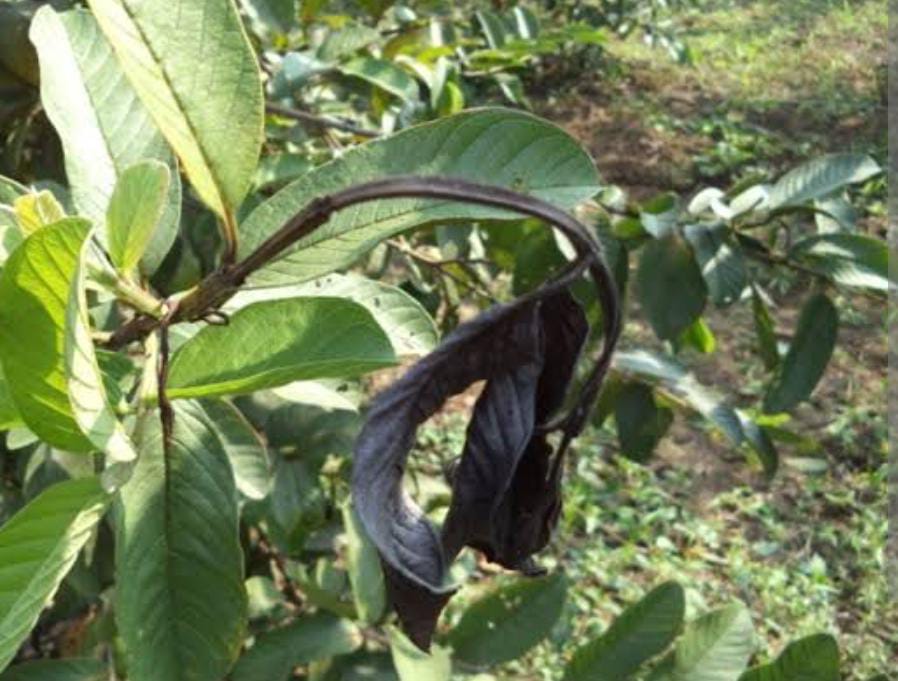Black Guava Plant
Black Guava trees require well-draining soil and full sun exposure. Water regularly, especially during dry periods. Prune to shape the tree and remove dead or diseased branches. Fertilize during the growing season for optimal fruit production.
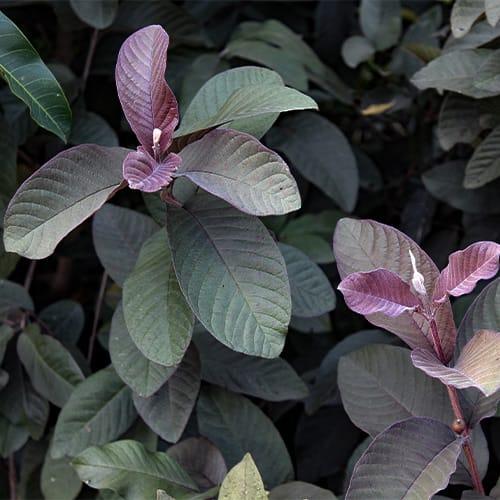
Habit
Tree
Height
3-4 m
Growth
Rapid
Soil
Well Drained, Loamy
Shade
Full Sun
Moisture
Moist
Edible
Yes [Fruit]
Medicinal
Yes
Origin
Tropical America
Climatic Condition
Tropical
Temperature (°)
20-30°C
Humidity (%)
70-80%
Potting media
Loam + Sand
Fertilizers
Balanced NPK (10:10:10)
Watering
Regular watering
Plant Weight
1-2 kg
Flowering Time
Spring to Summer
Soil Ph level
5.5-6.5
Water Ph level
6.0-6.5
Soil EC
1.0 dS/m
Yield Per Plant
60-150 kgs of fruit per year
NPK ratio
10:10:10
life Span
15-20 years
Health Benefits
Rich in vitamin C, digestive health
Suggested Grow Media or Potting Mix ?
50% loamy soil, 30% compost, 20% sand
Suggested Fertigation/Fertilizers
Fertilize every 2-3 months with a balanced fertilizer.
Common Diseases and Remedies
Anthracnose.
Infected leaves exhibit brown border , black sports.
Cow urine.
HEALTH BENEFITS
· High in vitamin C, boosting immunity.
· Contains antioxidants that support heart health.
· Aids digestion with fiber content.
What Is A Black Guava ?
Psidium guajava Black guava, also known as 'Black', is a variety of guava that varies from dark blood to black skin when ripe. It is a fruit tree native to Central and South America, grown for its sweet, aromatic, juicy fruits. Black guava plants need warm, well-drained soil to thrive. It is frequently used in jams, jellies and desserts due to its unique flavor and color.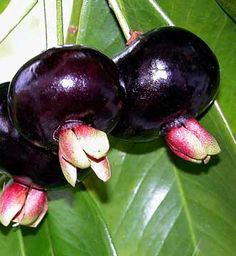
What Are The Different Types Of Black Guava?
There are many varieties of black guava and each has its own characteristics. Some of the most popular varieties include:
Psidium guajava 'Black':
This is the blackest variety of guava and is known for its dark purple to black rind when ripe. It is sweet, flavorful and often used in jams, jellies and desserts.
Psidium guajava 'Ruby Supreme':
This black fruit has a reddish-purple skin when ripe and has a sweet, juicy taste. It is often used in fresh fruit and smoothies.
Psidium guajava "Thai Black":
The skin of this black guava turns dark purple to black when ripe and has a sweet, rich flavor. It is frequently used in jams, jellies and desserts.
Psidium guajava "Black Pearl":
This black guava has red to black skin when ripe and is sweet and juicy. It is often used in fresh fruit and smoothies.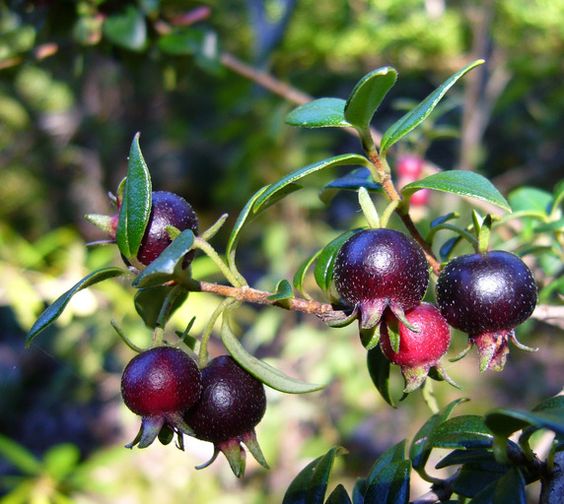
How To Care For Black Guava?
Location
Black guava plants grow in tropical and subtropical climates where temperatures remain warm throughout the year. They need well-drained soil and full sun to grow and bear fruit. The best places for black guava plants are:
1. * Tropical Regions:* Black guava plants grow best in tropical regions with warm temperatures and high humidity. They are found in countries such as Brazil, Mexico and India.
2. Subtropical Regions: Black guava plants can also grow in subtropical regions with mild winters and hot summers. They are commonly grown in parts of Florida and Australia in the United States.
3. * Greenhouse: * Black guava plants can be grown in a greenhouse to get the warmth and humidity they need in cold weather.
4. * Well-drained soil: * black guava plants prefer well-drained soil rich in organic matter. They cannot tolerate bad water.
5. * Full Sunlight: * Black guava plants need full sun to produce fruit. They should be planted in a location that receives at least 6 to 8 hours of sunlight per day.
6. * Frost Protection: * Black guava plants are sensitive to frost and should be protected from freezing temperatures. It can be grown in containers in cold climates and brought indoors in winter.
Sun light
Black guava plants need sunlight to grow and produce fruit. They should be planted in a location where they will receive at least 6 to 8 hours of direct sunlight per day. If planted in a location with insufficient sunlight, the plant will not bear fruit or may produce small, tasteless fruit. It is important to choose a sunny location to grow black guava plants to ensure good growth and fruit production.
Soil
Black guava plants prefer well-drained soil rich in organic matter. The best soil for black guava plants is slightly acidic with a pH between 5.5 and 7.0. Sandy loam or loam soil with good drainage is best for black guava plants.To prepare the soil for planting black rice, you can:
1. Test the Soil: Determine the pH of your soil using a soil test kit. If the pH is too high (alkaline), you can lower the pH by adding organic matter such as compost, peat moss, or pine needles.
2. *Improve the Water Well: * If your soil is heavy or poor, you can improve the water by adding sand, perlite or vermiculite to the soil.
Hydration
Black guava plants need proper irrigation, especially during the growing season and fruiting period. Watering frequency depends on factors such as climate, soil type and growth stage. Here are some tips for watering your black guava:
1. *Plants: * Black guava plants are drought tolerant once established. However, they need regular watering, especially during the dry season. Water deeply, allowing the water to penetrate the soil into the root zone.
2. *Seedlings: *New black guava plants need frequent watering to help them develop a strong root system. Water thoroughly every 2-3 days, depending on weather and humidity.
3. Fruiting Stage: When black coconut bears fruit, it requires more water to support the growth of the fruit. Water deeply every 1-2 days, depending on weather and humidity.
4. *Mulch: *A layer of mulch around the base of the black guava plant will help control moisture and reduce watering frequency.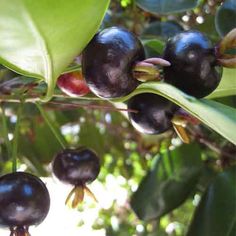
Nourishment
Black guava plants need proper nutrition to grow and produce healthy fruits. Here are some tips for providing your black guava plant with essential nutrients:
1. *Fertilization: *Black plants benefit from regular fertilization, especially during the growing season. Use a fertilizer balanced with 10-10-10 or similar and use according to the manufacturer's instructions. Avoid over-fertilization as this can lead to nutrient deficiencies and other problems.
2. * Organic Matter: * Add organic matter to the soil, such as compost, well-rotted manure or other organic matter, to improve soil fertility and structure. This will provide the black guava with necessary nutrients and promote healthy growth.
Issues
Growing black mangoes can be beneficial, but like any tree, they can face some problems. Here are some problems that may arise when growing a black guava tree and how to solve them:
1. * Pests: * Black guava plants are susceptible to pests such as fruit flies, aphids and beetles. Check plants regularly for pests and treat with insecticide or neem oil if necessary.
2. * Diseases: *Black plants may be affected by diseases such as anthracnose, powdery mildew and root rot. To prevent disease, avoid overwatering, provide good ventilation, and keep plants healthy by feeding them properly.
3. * Fruit drop: * Fruit drop, that is, early fruit drop, can be observed in black guava plants. This may be due to factors such as poor pollination, malnutrition or environmental stress. Make sure plants are well fertilized, watered and cared for so they don't lose fruit.
4. * Heat: * Black guava plants can be sensitive to sunlight, especially when young. Protect them from direct sunlight during the hottest parts of the day and provide shade when necessary.
5. * Nutrient Deficiencies: * black guava plants may indicate nutrient deficiencies such as yellow leaves or stunted growth. Test the soil and adjust pH if necessary and provide appropriate fertilizer to correct nutrient deficiencies.
What Are The Benefits Of Black Guava ?The black guava plant has many good fruits and ornamental values. Some benefits of black guava tree include:
1. *Nutritional value: *Guava fruit is rich in dietary fiber as well as vitamins A and C. It also contains antioxidants that help prevent oxidative stress and inflammation
.2. Taste: Black guava fruit has a sweet, aromatic taste that is unique and delicious. It can be eaten fresh or used in various dishes such as sauces, jellies and desserts.
3. * Ornamental Value: * Black guava plants have leaves and flowers, making them a beautiful addition to any garden or landscape. Dark purple to black berries add visual interest and contrast.
4. Medical Uses: In medicine, black fruits and leaves are used to treat various diseases such as diarrhea, stomach ache and wounds. Some studies suggest that black guava may have antibacterial and anti-inflammatory properties.
FAQs About Growing Black Guava
1. How to control black guava?
Caring for the black guava plant has many important tasks to ensure its health and productivity. Here are some tips for managing black guava plants:
1. * Watering: * Black guava plants need to be watered regularly, especially during the dry season. Water deeply, allowing the water to penetrate the soil and reach the root zone. Avoid overwatering as this can cause root rot and other problems.
2. *Fertilization: *Black plants benefit from regular fertilization, especially during the growing season. Use a fertilizer balanced with 10-10-10 or similar and use according to the manufacturer's instructions. Avoid over-fertilization as this can lead to nutrient deficiencies and other problems.
3. * Pruning: * Prune black guava plants to remove dead or diseased branches, improve air circulation and encourage fruit production. Pruning should be done in late winter or early spring before new growth begins.
4. * Pests and Diseases: * Inspect black plants regularly for pests and diseases such as fruit flies, aphids, powdery mildew and root rot. Treat them with insecticidal soap, neem oil or other appropriate treatments as needed.
2. How to use black guava?
Black guava has many uses, including cooking and medicine. Some uses of the black guava plant are:
1. * Food Use: * Black fruit can be eaten fresh or used in various cooking methods. It has a sweet, aromatic taste that is unique and delicious. Blackberries can be used to make jam, jelly, desserts, smoothies and fruit salads.
2. Medical Use: In medicine, black fruits and leaves are used in the treatment of many diseases. Black fruit is rich in vitamins A and C, as well as dietary fiber and antioxidants that help prevent oxidative stress and inflammation. Some studies suggest that black guava may have antibacterial and anti-inflammatory properties.
3. Ornamental Value: Black guava plants have beautiful leaves and flowers, making them a beautiful addition to any garden or landscape. Dark purple to black berries add visual interest and contrast.
4. * Loves wildlife: * Black guava plants attract birds and other wildlife, helping you diversify your garden.
3. Can I grow black guava indoors?
1. * Light:* Black guava plants need full sun to produce fruit. If you're growing them indoors, place them in a location that gets at least 6 to 8 hours of direct sunlight per day. If there is not enough natural light, you will need to supplement your grow lights.
2. * Temperature: * Black guava plants prefer warm temperatures, 65°F to 85°F (18°C to 29°C) is best. Do not place near a vent or heat source as sudden heat and cold may affect the plant.
3. * Soil:* Use a well-drained potting mix rich in organic matter. A mixture of peat moss, perlite and compost is ideal for black plants.
4. * Water: * Water your black guava plant deeply and allow the soil to dry out a bit from the water. Avoid overwatering as this can cause root rot.
5. Fertilization: Fertilize black guava plants regularly with a balanced fertilizer according to manufacturer's instructions. Avoid over-fertilization as this can lead to nutrient deficiencies.
